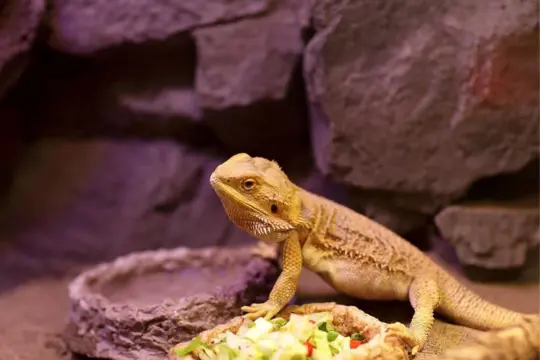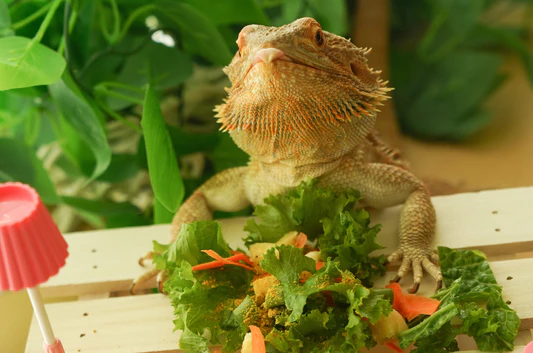
Since they are omnivores, bearded dragons can eat a variety of human foods. Some of the safe foods for bearded dragons are:
- Live food: Crickets, mealworms, earthworms, butter worms, silkworms, super worms, cockroaches, wax worms, king worms, and hornworms.
- Vegetables: Kale, asparagus, butternut squash, yellow squash, acorn squash, spaghetti squash, cabbage, carrots, collard greens, pumpkin, sweet potato, and tomatoes.
- Fruits (occasionally as treats): Apples, bananas, blueberries, grapes, strawberries, watermelon, and raspberries.
- Lean meats: Turkey, minced beef, steak, pork, and chicken breast.
Bearded dragons should be fed a balanced diet, which consists of approximately 70% of leafy greens, 20% of colored vegetables, 10% of fruits, and occasionally insects.
Why It’s Important to Know What Human Foods Bearded Dragons Can Eat

As omnivores, bearded dragons require a balanced diet of both animal protein and vegetables/fruits for optimal health. However, not all human foods are safe for them to consume, which is why it’s crucial to know which foods they can eat and which ones they should avoid.
Feeding your bearded dragon an inappropriate diet can lead to severe health problems such as metabolic bone disease or obesity. Additionally, some human foods may contain harmful additives or preservatives that can harm your pet’s health over time.
Incorporating human foods into your bearded dragon’s diet requires careful consideration of nutritional value and potential risks associated with each food item.
Vegetables and Fruits
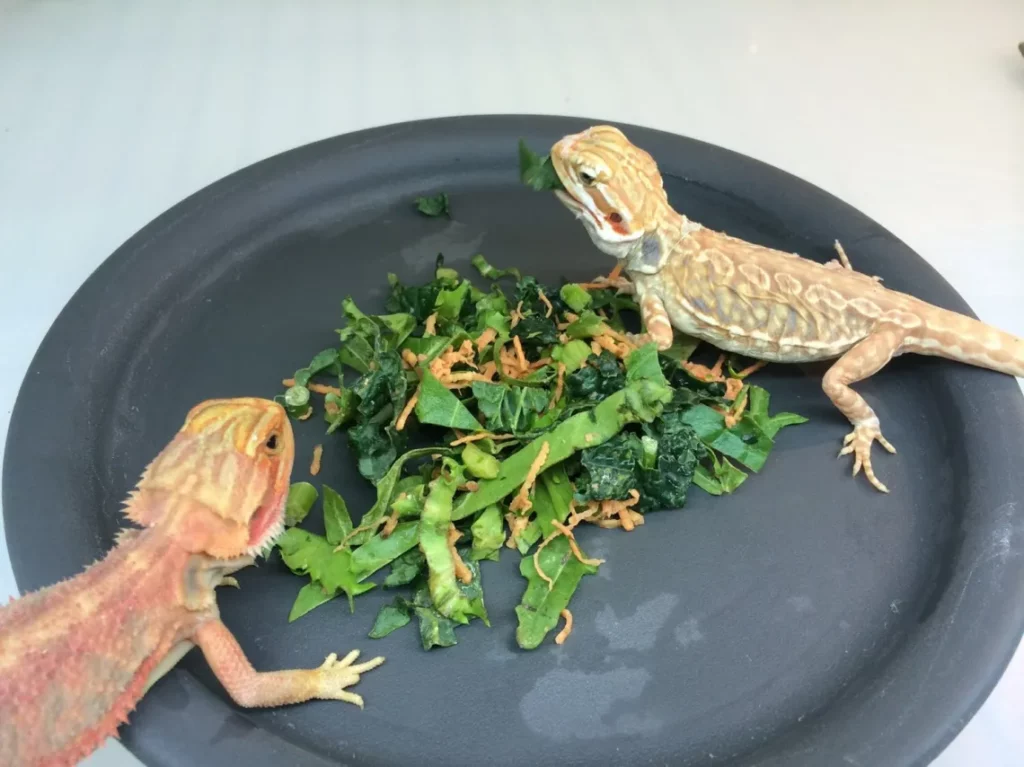
List of safe vegetables and fruits
Bearded dragons are omnivores, which means they require a mix of plant and animal-based foods in their diet. Including fruits and vegetables in their diet is essential to provide them with the required vitamins, minerals, and fiber.
Some safe vegetables that bearded dragons can eat include dark leafy greens such as collard greens, turnip greens, kale, mustard greens, dandelion greens as well as squash and pumpkin.
Dark leafy greens are an excellent source of vitamins A, C, K, calcium, iron, potassium, and magnesium. These nutrients help maintain healthy skin integrity; vitamin A supports eye health while the other nutrients ensure proper organ function.
Squash and pumpkin are good sources of fiber that aid in digestion. They also contain vitamin A to help improve eyesight.
These vegetables should be fed to bearded dragons sparingly because they contain a high concentration of oxalates which can cause renal problems if consumed frequently.
Berries and Melons
Another group of fruits that bearded dragons can eat safely includes berries such as strawberries or blueberries along with melons like cantaloupe or honeydew melon.
Berries contain antioxidants that help fight diseases while melons have plenty of water content that helps keep them hydrated.
Both types of fruits provide a sweet treat for your dragon while still providing nutritional value.
Apples and Pears
Apples have been known for ages as one of the best human foods for consumption due to their rich nutritious content; it’s no wonder why they’re perfect food for our reptilian friends too!
Apples contain vitamins A & C which support immunity function while pears have copper which makes them suitable for healthy bone growth.
Including fresh fruits and veggies in a bearded dragon’s diet is essential to maintain optimal health.
It’s best to feed them a variety of fruits and vegetables, so they get the proper nutrients they need while still enjoying a diverse menu.
Remember always to wash any fruits or vegetables before feeding them to your beardie and remove any uneaten food since it can attract insects or encourage bacterial growth.
Protein Sources
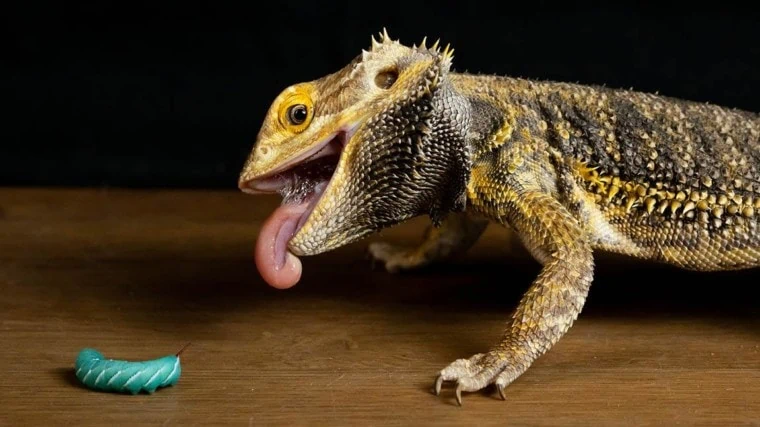
List of Safe Protein Sources
Bearded dragons are omnivores, meaning that they require both plant-based and animal-based protein sources in their diet.
While insects are the most common source of protein for bearded dragons, not all insects are suitable. Crickets, mealworms, dubia roaches, and super worms are all excellent sources of protein that can be safely fed to bearded dragons.
In addition to insects, cooked eggs and chicken can also be given to bearded dragons as a source of protein.
However, it is important to note that these should only be given occasionally as treats and should not make up a significant part of their diet.
Explanation of Nutritional Benefits
Protein is an essential nutrient for bearded dragons as it helps to build and repair muscle tissue. Insects such as crickets and mealworms are also good sources of protein, which helps with digestion by providing roughage in the diet.
Dubia roaches and superworms are also excellent sources of calcium, which is important for maintaining strong bones.
Eggs provide high-quality protein as well as vitamin A, which is essential for maintaining healthy skin and vision.
Chicken provides a good source of lean protein without the added fat found in other meats.
Calcium Supplements
The Importance of Calcium Supplements for Bearded Dragons’ Health
One of the most important nutrients in a bearded dragon’s diet is calcium. These reptiles need calcium to grow and maintain strong bones, as well as to carry out other important bodily functions, such as muscle and nerve function.
Inadequate calcium intake can lead to a range of health problems, including metabolic bone disease (MBD), which can be fatal.
Unfortunately, many captive bearded dragons don’t get the amount of dietary calcium they need. This is because their diets are often low in calcium-rich foods like dark leafy greens and high in phosphorus-rich foods like crickets and mealworms.
To make up for this imbalance, it’s crucial that pet owners supplement their bearded dragons’ diets with additional calcium.
Listing Calcium Supplements That Are Safe for Bearded Dragons
There are several types of calcium supplements available on the market that are safe for bearded dragons to consume. The most common form of supplement is a powder that can be sprinkled on top of your pet’s food.
Some popular brands include Rep-Cal and Zoo Med. Another option is to provide your dragon with a cuttlebone or mineral block designed specifically for reptiles.
These products contain high levels of natural calcium that can help support your dragon’s bone health. It’s important to note that while providing supplemental calcium is crucial for maintaining your pet’s health, it’s also possible to over-supplement with this nutrient.
Too much calcium can lead to health issues just as easily as too little. Make sure you follow the instructions on any supplement you use carefully and always speak with your veterinarian if you have any questions or concerns about your pet’s diet or overall health.
By providing calcium supplements in addition to a balanced diet, you can help your pet avoid the serious consequences of inadequate calcium intake.
Treats to Avoid
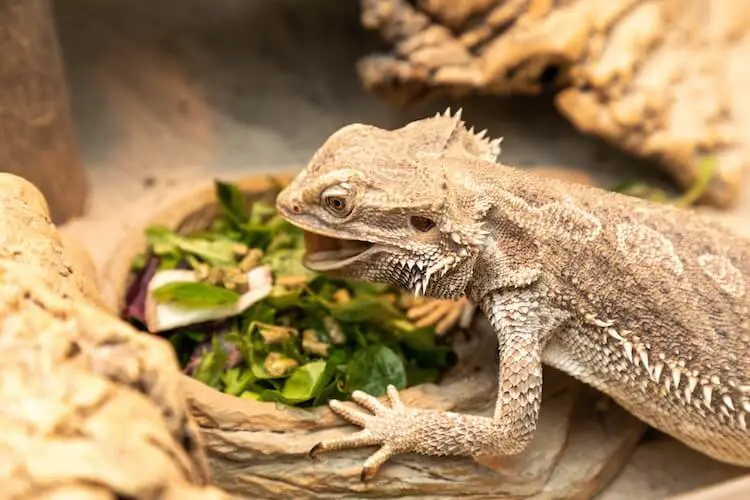
Foods that should not be fed to bearded dragons.
While bearded dragons are omnivores, they cannot eat all human foods. Some foods can cause serious health problems and must strictly be avoided.
Here are some of the treats you should never give your pet:
Avocado: Avocado contains a toxin called persin that can lead to heart damage and death in bearded dragons.
Citrus fruit: Citrus fruits such as oranges, lemons, limes, and grapefruits contain high levels of citric acid which can cause digestive problems and mouth sores.
Rhubarb: Rhubarb is rich in calcium oxalate crystals which can inhibit calcium absorption, causing metabolic bone disease.
Explanation of why these treats should not be given.
Most forbidden human foods for bearded dragons contain toxins or high levels of compounds that pose a risk to their health.
For instance, avocado is highly toxic to many animals including birds and reptiles due to the presence of persin. This chemical causes myocardial necrosis which leads to heart failure.
Similarly, rhubarb contains high amounts of oxalic acid which binds with calcium in the body causing hypocalcemia.
Citrus fruits are challenging for beardies because they have a very acidic content that may irritate their delicate digestive system or cause mouth sores.
Some other types of food like chocolate or dairy products may contain too much sugar or fat and might lead to obesity in your dragon if given regularly.
Conclusion
Feeding your pet inappropriate foods can put them at risk of chronic illnesses or even death.
Always research before giving your pet any new food item or treat – consulting with an expert might help you save money on vet bills down the line! Make sure to feed your bearded dragon a balanced diet that includes vegetables, fruits, and proteins.
Stick to the safe and nutritious options listed in this article to ensure your pet has a healthy and active life.
